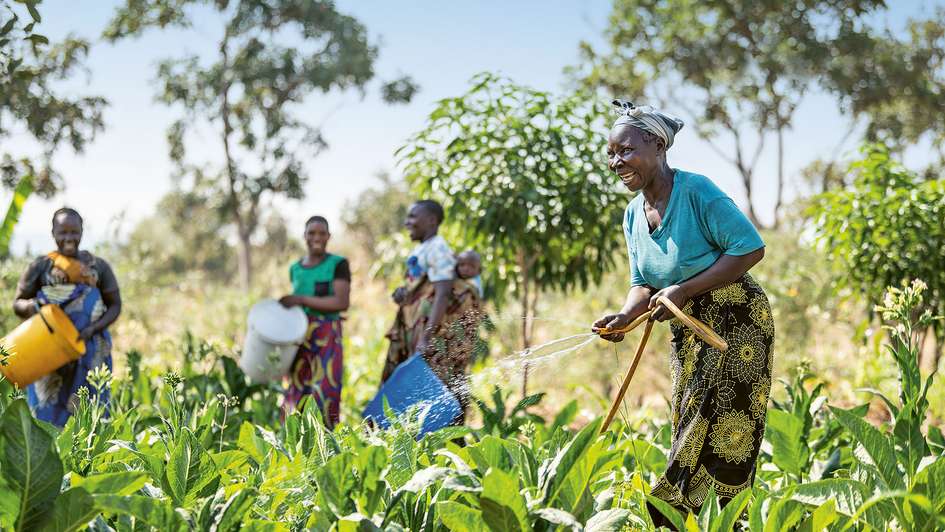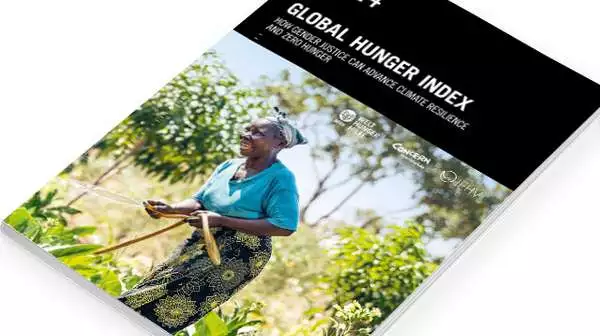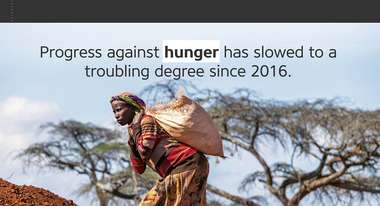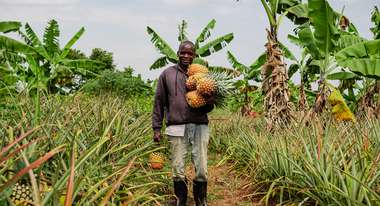Report, synopsis, map: All documents can be downloaded here in English and other languages.
Launch of the 2024 Global Hunger Index
Progress in addressing hunger has stagnated, finds new report

Bonn/Berlin/Dublin/Bochum, 10 October 2024. As we edge closer to 2030, the target year to achieve the UN Sustainable Development Goals, the prospects of reaching Goal 2: Zero Hunger are grim. Progress against hunger has slowed to a troubling degree owing to a barrage of successive and overlapping challenges that have hit the world’s poorest countries and people hardest, amplifying structural inequalities.
The 2024 Global Hunger Index (GHI), published today, shows hunger levels are at serious or alarming levels in 42 countries. Progress in addressing hunger has stagnated, with little noted change since 2016, owing to persistent inequalities, large-scale armed conflicts, increasingly severe climate impacts, high domestic food prices, economic downturns, and debt crises in many countries. At the current pace, at least 64 countries, or half of those ranked in the report, will not reach low hunger— much less Zero Hunger – by 2030. In fact, remaining at this progress pace, we will not reach even low hunger until 2160 – more than 130 years from now.
Conflict has again raised the spectre of famine. Gaza is experiencing its most severe food crisis recorded in the past 20 years, as almost the entire population of Gaza is facing crisis levels of acute food insecurity, and famine might already be occurring. In Sudan, people are facing a hunger crisis on a scale not experienced since the Darfur crisis of the early 2000’s, resulting from the escalating conflict and the deliberate destruction of Sudan’s food system and denial of humanitarian aid access.
‘That hunger persists on such a scale with all the resources in the modern world is deeply troubling. That progress being made in addressing hunger has stalled due to the manmade impact of conflict and climate change should be alarming. How can we ignore over 2.8 billion people who cannot afford a healthy diet?’ Said David Regan, Chief Executive of Concern Worldwide.
The GHI scores countries using a 100-point severity of hunger scale (see Notes to the Editor).
Six countries have levels of hunger considered alarming, indicating widespread human misery, undernourishment and malnutrition. Somalia, Yemen, Chad, and Madagascar are the countries with the highest 2024 GHI scores; Burundi and South Sudan are also provisionally designated as alarming.
Examples of progress and hope exist amid crises and worrying trends. For example, Bangladesh, Mozambique, and Nepal have significantly reduced their GHI scores in the past years, contrary to the global trend.
This year’s GHI places emphasis on the linkages between gender inequality, food and nutrition insecurity and climate change, highlighting how these challenges converge to place households, communities and countries under extreme stress.
Essay authors Nity Rao of the University of Anglia, Siera Vercillo of Wageningen University, and Gertrude Dzifa Torvikey of the University of Ghana, examine gender justice as the cornerstone to achieving climate resilience and food and nutrition security. The authors argue that gender justice is central to effective climate action and food systems transformation. Achieving gender justice requires change at all scales and levels, from individuals to entire systems.
‘Gender inequality, climate vulnerability, and hunger often go hand in hand. Addressing gender inequality has the potential to lift millions out of hunger, improve child nutrition, and boost overall well-being. Governments must urgently use public investments in care, education, health, and rural development to address discriminatory norms and promote equitable distribution of labor.’ Said Mathias Mogge, Chief Executive Officer of Welthungerhilfe.
As the world commemorates the 75th anniversary of the Universal Declaration of Human Rights and the 20th anniversary of the Voluntary guidelines on the Right to Food in 2024, the GHI co-authors Welthungerhilfe (WHH), Concern Worldwide, and the Institute for International Law of Peace and Armed Conflict (IFHV) call for greater urgency and coherence across policies to address hunger. States must strengthen accountability on the right to food and international law and invest in integrated solutions to promote gender, climate and food justice.
To read the 2024 GHI report visit www.globalhungerindex.org.
For media queries contact
- Simone Pott, Spokesperson, Welthungerhilfe (WHH) at simone.pott(at)welthungerhilfe.de or on +49 178 3700129.
- Kevin Jenkinson, Media Officer, Concern Worldwide at [email protected] or on +353 86 358 2886.
Notes to the Editor
The GHI, now in its 19th year, ranks countries based on four key indicators:
- Undernourishment – the share of the population with insufficient caloric intake;
- Child stunting – the share of children aged under-five who have low height for their age, reflecting chronic undernutrition;
- Child wasting – the share of children aged under-five who have low weight for their height, reflecting acute malnutrition;
- Child mortality – the share of children who die before their fifth birthday, partly reflecting the fatal mix of inadequate nutrition and unhealthy environments.
Countries are scored on a 100-point severity of hunger scale where zero is the best possible score (no hunger) and 100 is the worst:
- Extremely alarming – equal to or greater than 50;
- Alarming – 35 to 49.9; Serious – 20 to 34.9;
- Moderate – 10 to 19.9;
- Low – equal to or lower than 9.9.





